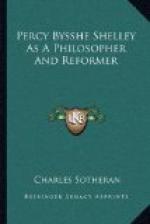“Spirit of Nature! all
sufficing power,
Necessity! thou mother of
the world!
Unlike the God of human error,
thou
Requirest no prayers or praises,
the caprice
Of man’s weak will belongs
no more to thee
Than do the changeful passions
of his breast
To thy unvarying harmony.”
And by this doctrine of necessity here apostrophised our philosopher instructs us in a lengthy statement of great clearness:
“We are taught that there is neither good nor evil in the universe, otherwise than as the events to which we apply these epithets have relation to our own peculiar mode of being. Still less than with the hypothesis of a personal God, will the doctrine of necessity accord with the belief of a future state of punishment. God made man such as he is, and then damned him for being so; for to say that God was the author of all good, and man the author of all evil, is to say that one man made a straight line and a crooked one, and another man made the incongruity.”
For you to better understand the exact position in which Shelley placed himself, it is elsewhere thus admirably expressed:
“The thoughts which the word ‘God’ suggest to the human mind are susceptible of as many variations as human minds themselves. The Stoic, the Platonist, and the Epicurean, the Polytheist, the Dualist, and the Trinitarian, differ entirely in their conceptions of its meaning. They agree only in considering it the most awful and most venerable of names, as a common term to express all of mystery, or majesty, or power, which the invisible world contains. And not only has every sect distinct conceptions of the application of this name, but scarcely two individuals of the same sect, which exercise in any degree the freedom of their judgment, or yield themselves with any candor of feeling to the influences of the visible world, find perfect coincidence of opinion to exist between them.... God is neither the Jupiter who sends rain upon the earth; nor the Venus through whom all living things are produced; nor the Vulcan who presides over the terrestrial element of fire; nor the Vesta that preserves the light which is enshrined in the sun, the moon, and the stars. He is neither the Proteus nor the Pan of the material world. But the word ‘God’ unites all the attributes which these denominations contain and is the (inter-point) and over-ruling spirit of all the energy and wisdom included within the circle of existing things.”
Of these attributes generally supposed to appertain to Deity, he writes:
“There is no attribute of God which is not either borrowed from the passions and powers of the human mind, or which is not a negation. Omniscience, omnipotence, omnipresence, infinity, immutability, incomprehensibility, and immateriality, are all words which designate properties and powers peculiar to organized beings, with the addition of negations, by which the idea




